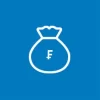Would you like an overview of fund savings plans? Then have it sent to you here free of charge as a PDF file.

Swiss Fund Savings Plan Guide
Get informed about what to consider when choosing a funds-based savings plan in Switzerland.
1. What is a funds-based savings plan?
A savings plan is a service by which you build up wealth by making regular, identical deposits into a bank account (using a standing order, for example).
With funds-based savings plans, you make the regular deposits into an investment fund account or asset management service. The money you deposit into this account is automatically invested in investment funds.
2. Where can I find a Swiss savings plan comparison?
You can get a detailed Swiss savings plan comparison as a PDF for free at the foot of this guide.
3. How do I pay money into a funds-based savings plan?
All Swiss funds-based savings plans accept bank transfers and standing orders. Most savings plans accept monthly deposits, but some also let you make daily, bimonthly, quarterly, semiannual and annual payments.
All savings plans are flexible in that you can make unscheduled deposits into your investment fund account or asset management service in addition to the regular payments. All money deposited into your savings plan is invested in the predefined funds.
4. What is the smallest payment I can make into a savings plan?
The minimum amount which can be deposited into a savings plan varies between banks. It is typically either 20, 50, or 100 francs. Some banks also have a minimum requirement (500 francs, for example) for the initial deposit when you open your savings plan.
5. Do I need a private account to use a savings plan?
Some banks require you to hold a private account at the same bank in order to open a savings plan. Some banks also let you open a savings plan if you hold a savings account.
Some service providers do not require you to hold a private account or a savings account with them. You can find detailed information about account requirements in the savings plan comparison.
6. Are there savings plans for children and adolescents?
Yes. Some banks offer fund-based savings plans with special, favorable conditions for children and teenagers up to a certain age. The age limit for favorable conditions is typically 18 years old, though at some service providers it is as high as age 26. You can find this information in the savings plan comparison.
7. Can savings plans be used as gift accounts for children?
Yes, a few service providers offer savings plans which work like gift accounts for children. The savings plan comparison shows which savings plans are available as gift savings plans for children.
8. Which fees apply to savings plans?
There are a number of different fees which can apply to fund-based savings plans:
- TERs: The fees and costs charged by an investment fund itself make up its total expense ratio (TER). A fund’s TER is published as an annual percentage. TERs are accounted for in the performance figures published by funds.
- Sales Charges: Sales charges and deferred sales charges – known as front-end loads and back-end loads in investment jargon – are one-time fees charged by investment funds every time you buy fund shares. The funds available with savings plans may have front-end loads, but generally do not have back-end loads.
- Custody fees: The custodian bank which holds your fund shares may charge custodial fees (also known as safekeeping fees) every year. Custodial fees are typically charged as a percentage of the value of your investment.
- Asset management fees: Some banks and other savings plan providers charge flat fees which apply every year. These are typically based on a percentage of the value of your investment.
- Brokerage fees: Banks or asset managers may charge brokerage fees when they buy or sell your fund shares. These one-time fees apply every time your deposit is invested in funds (every month, for example), and when your fund shares are sold (when you cash out your savings plan, for example).
- Currency exchange costs. These costs may be charged by funds for investments they make in foreign currencies.
- Closure fees. You may pay a fee when you cash out your savings plan.
- Private account fees. If a bank requires you to hold a private account in order to open a savings plan, then you may pay fees for the private account.
- Fees for tax statements.
- Value added tax (this may be levied on custodial fees or asset management fees, for example).
- Stamp duties.
- Retrocession fees: These are sales commissions which banks receive from funds. In Switzerland the cost of commissions is not charged to you as the customer. Some service providers even pass on retrocession fees which they receive from funds to you as the investor.
These are the most important fees to consider when choosing a savings plan:
- Recurring TER fees (these are published in fund prospectuses).
- Recurring flat fees (asset management fees) and/or custodial fees.
- One-time brokerage fees and sales charges.
9. Do service providers earn retrocession fees on savings plans?
Some funds pay out sales commissions to banks and other service providers which onboard new capital. Some banks use only funds which do not pay out sales commissions or pass sales commissions on to their customers. Others keep the sales commissions.
10. How much do the funds used in savings plans cost?
The TERs of funds used in Swiss savings plans range between 0.07% and nearly 3% per annum, depending on the fund. And funds with TERs above 1% per annum are relatively expensive.
Additionally, some funds have one-time sales charges equal to up to 2% of each new purchase of fund shares. It is preferrable to use funds which do not charge high sales charges.
11. What do tax statements cost?
Many savings plans do not have fees for annual tax statements, but some do. Some banks charge between 30 and 100 francs for unabridged tax statements. However, unabridged tax statements are only required in exceptional cases (for detailed auditing by tax offices, for example).
12. What is the total cost of investing with a Swiss savings plan?
On average, Swiss savings plans are relatively expensive. But there are major differences between the costs of different Swiss savings plan offers. Comparing is the key to minimizing costs and optimizing returns.
moneyland.ch modeled the total costs of Swiss funds-based savings plans. The simulation assumes a 5-year savings plan term with recurring deposits of 500 Swiss francs per quarter.
The simulation accounts for the most important fees, including custodial fees, asset management fees, brokerage fees, fund sales charges and deferred sales charges, and fund TERs. For TER calculations, moneyland.ch used two different models – one accounting for the cheapest available fund and the other accounting for the most expensive available fund.
Important: The costs shown here are only indicators. Cost can vary from the modelled costs depending on the funds you select for your savings plan and your saving habits. You can find detailed information about savings plans (as per November 2021), along with additional offers like youth savings plans, in the savings plan comparison PDF.
|
Savings Plans for Adults |
Total Costs in CHF |
|
|---|---|---|
| Minimum | Maximum | |
| Aargauische Kantonalbank Fondssparplan |
269 | 844 |
| Avadis Vermögensbildung SICAV |
39 | 166 |
| Berner Kantonalbank BEKB Fondssparplan |
384 | 529 |
| cash - bank zweiplus Fondssparplan |
486 | 983 |
| Credit Agricole next bank Investment Fund Savings Plan |
341 | 696 |
| Credit Suisse Investment Fund Savings Plan |
110 | 662 |
| clevercircles Flexibler Sparplan |
183 | 420 |
| findependent ETF-Anlagelösung |
133 | 363 |
| Banque Cantonale de Genève BCGE Fund Savings Plan |
200 | 728 |
| Luzerner Kantonalbank Fondssparplan |
318 | 542 |
| Migros Bank Fondssparplan |
229 | 456 |
| PostFinance Funds Saving Plan |
168 | 793 |
| Raiffeisen Fonds-Sparplan |
193 | 784 |
| Selma Monatlicher Sparplan |
191 | 423 |
| Sparkasse Schwyz Sparplan Fondsinvest |
336 | 780 |
| St.Galler Kantonalbank Fondssparplan |
220 | 581 |
| Thurgauer Kantonalbank TKB Zielsparplan |
326 | 399 |
| True Wealth Global ETF Portfolio |
150 | 329 |
| UBS Investment Fund Account |
120 | 941 |
| VZ Depotbank Saving and investing with ETF |
163 | 315 |
| Zuger Kantonalbank Fondssparplan |
226 | 714 |
| Zürcher Kantonalbank Fondsportfolio |
336 | 534 |
13. How many different funds can I choose from?
Many savings plans only let you choose from a very limited number of investment funds. In many cases, you are limited to the strategy funds belonging to the bank which offers the savings plan. But there are banks like CASH Bank Zweiplus which let you pick from many Swiss mutual funds, index funds and exchange-traded funds (ETFs).
14. Are there any Swiss ETF savings plans?
The majority of the funds used by Swiss savings plans are actively-managed mutual funds. Only a limited number of Swiss financial services providers offer ETF savings plans.
Savings plans from these providers offer ETFs and/or index funds:
- Aargauische Kantonalbank: 7 index funds
- Avadis: Offers passively-managed funds, but not ETFs.
- Cash – Bank Zweiplus: Various ETFs available.
- Clevercircles: 7 index funds and 9 ETFs.
- Findependent: 30 ETFs.
- Selma: 20 ETFs.
- Sparkasse Schwyz: 13 ETFs offered.
- True Wealth: 88 ETFs offered.
- VZ Depotbank: 45 Index funds and ETFs offered.
- Zuger Kantonalbank: 4 ETFs offered.
15. Are passively-managed funds better than actively-managed funds?
Passively-managed funds like index funds and ETFs are generally preferrable to actively-managed funds. There are two reasons for this: Firstly, passively-managed funds are typically much cheaper. Secondly, the vast majority of active fund managers have not been able to outperform market indexes over the long term.
16. Are there any Swiss systematic withdrawal plans?
The majority of Swiss funds-based savings plans give you the option of using them as systematic withdrawal plans. A systematic withdrawal plan is the opposite of a savings plan. It lets cash out the money in your savings plan as a series of regular withdrawals instead of a lump sum. Fund shares are sold as needed when each outgoing payment is made. You choose how frequently payments from your savings to you should occur, and how high the recurring payment should be.
Some banks only let you set up a systematic withdrawal plan if you hold at least a minimum amount in fund assets (20,000 francs, for example).
17. What is unit cost averaging and can it benefit me?
Many banks advertise funds-based savings plans as a tool for taking advantage of the cost average effect. The principle of unit cost averaging is that by dividing a large investment into a series of small, recurring investments at regular points in time, you avoid investing everything at the wrong time. But compared to one-time investments of larger amounts of capital, you lose out on the chance of making exceptional returns by buying in big when rates are particularly favorable.
18. How many funds can I use in one savings plan?
Many savings plans only let you use a single investment fund. But some banks let you create portfolios of several funds per savings plan.
19. Which currencies are Swiss savings plans offered in?
All Swiss fund-based savings plans are offered in versions denominated by the Swiss franc. Many are also offered as euro and US dollar savings plans. Savings plans denominated by the British pound or the Japanese yen are less common.
20. How can I find the best fund-based savings plan for my needs?
- Costs
Performance comparisons should not be a primary factor when choosing savings plans because past performance is no clear indicator of future performance. Choose the most affordable savings plan which matches your investment needs.
These recurring costs have the biggest impact: fund TERs; custody fees and/or asset management fees. Ideally, the savings plan should also have low brokerage fees and fund sales charges, or none at all. - Selection of funds
Having a good selection of funds to choose from is generally advantageous. If a savings plan only offers a limited number of funds, these funds must be exceptional (primarily affordable). Passively-managed funds are generally more favorable than actively-managed funds. - More criteria
There are other criteria which can also play a significant role, depending on your needs. An important criterion is whether bank requires you to open a private account in order to use its savings plan. If you do not already use a private account from that bank and are not interested in opening a new private account, you can rule out savings pans from these banks.
Other possible factors: Minimum initial capital requirements (these can be as high as 8500 francs with some service providers); the availability of gift or youth savings plans; the number of funds which can be included in a savings plan portfolio; the minimum size for recurring deposits (this can be as high as 100 francs per payment); the frequency with which deposits can be made. Other criteria may also apply to your specific situation (if you are looking for a pillar 3a retirement fund savings plan, for example).
21. What are the advantages of fund-based savings plans?
The simplicity of savings plans is a major advantage. You do not have to have any investment know-how and you do not have to buy and sell securities yourself. The bank handles all investing for you automatically.
Another advantage of savings plans is that investment happens automatically and does not require much self-discipline. You simply need to set up an initial standing order to have the money deducted from your bank account every pay day.
An advantage for small savers is that savings plans let you participate in the stock and bond markets even if you only have relatively small amounts of money to begin investing with. Fund savings plans benefit small savers by providing access to stock and bond investment without high initial capital requirements (like those of asset management services).
22. What are the disadvantages of funds-based savings plans?
Funds-based savings plans have two primary disadvantages.
Firstly, most savings plans only let you choose from a small selection of funds. Currently, only a few savings plans offer low-cost ETFs.
Secondly, Swiss funds-based savings plans are expensive, on average. This also applies to most of the funds used.
23. Are there any alternatives to savings plans?
The best alternative to funds-based savings plans is investing directly in low-cost ETFs with an affordable online broker. The disadvantage is that a fair amount of research may be necessary depending on your investment know-how. Another disadvantage is that Swiss brokers generally have minimum brokerage fees that you have to pay every time you buy fund shares. This means direct investment with a stock broker can be expensive for making a series of small ETF investments.
Another alternative is investing in ETFs via an affordable asset management service (a robo advisor, for example). Some digital asset management providers offer savings plans, and are included in the savings plan comparison.
More on this topic:
Compare Swiss asset management services now
Compare Swiss retirement funds now
Compare Swiss stock brokers now

Choice of digital asset managers
True Wealth
BLKB as partner and custody bank
Flat fee: 0.5% - 0.25%
Free test account
Clevercircles
Digital asset manager
An offer from the bank CIC
Free test account
Selma
Digital financial assistant
Free investment plan
Free test account
Swiss wealth managers
volt by Vontobel
Access to Vontobel investment experts
Individually selectable investment products
Information without obligation
Bank CIC cleverinvest
Digital asset manager
Flat fee of 0.5%
Already from CHF 1000
PostFinance E-Investment Management
Digital wealth management
From CHF 5000
Direct opening possible





